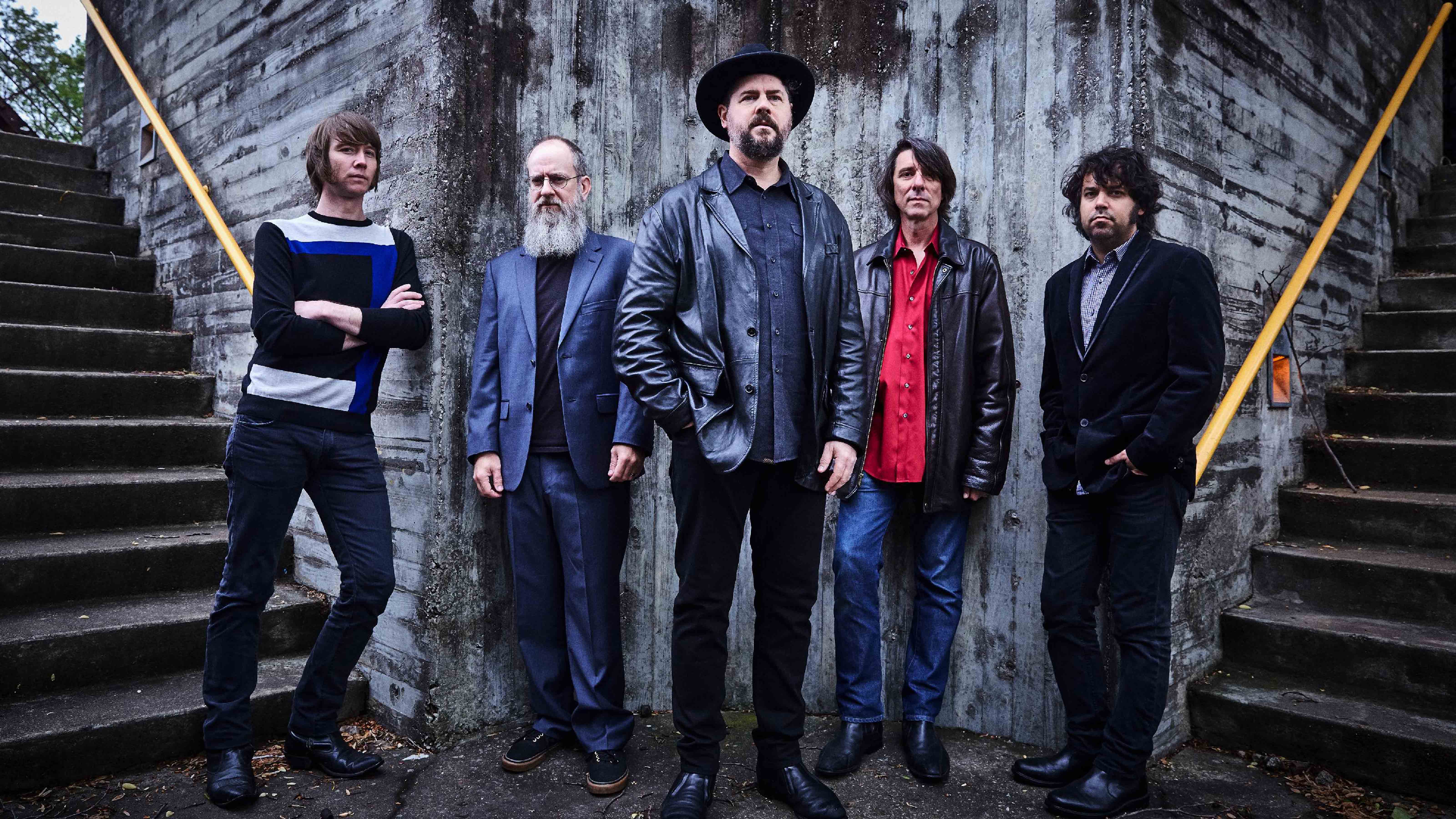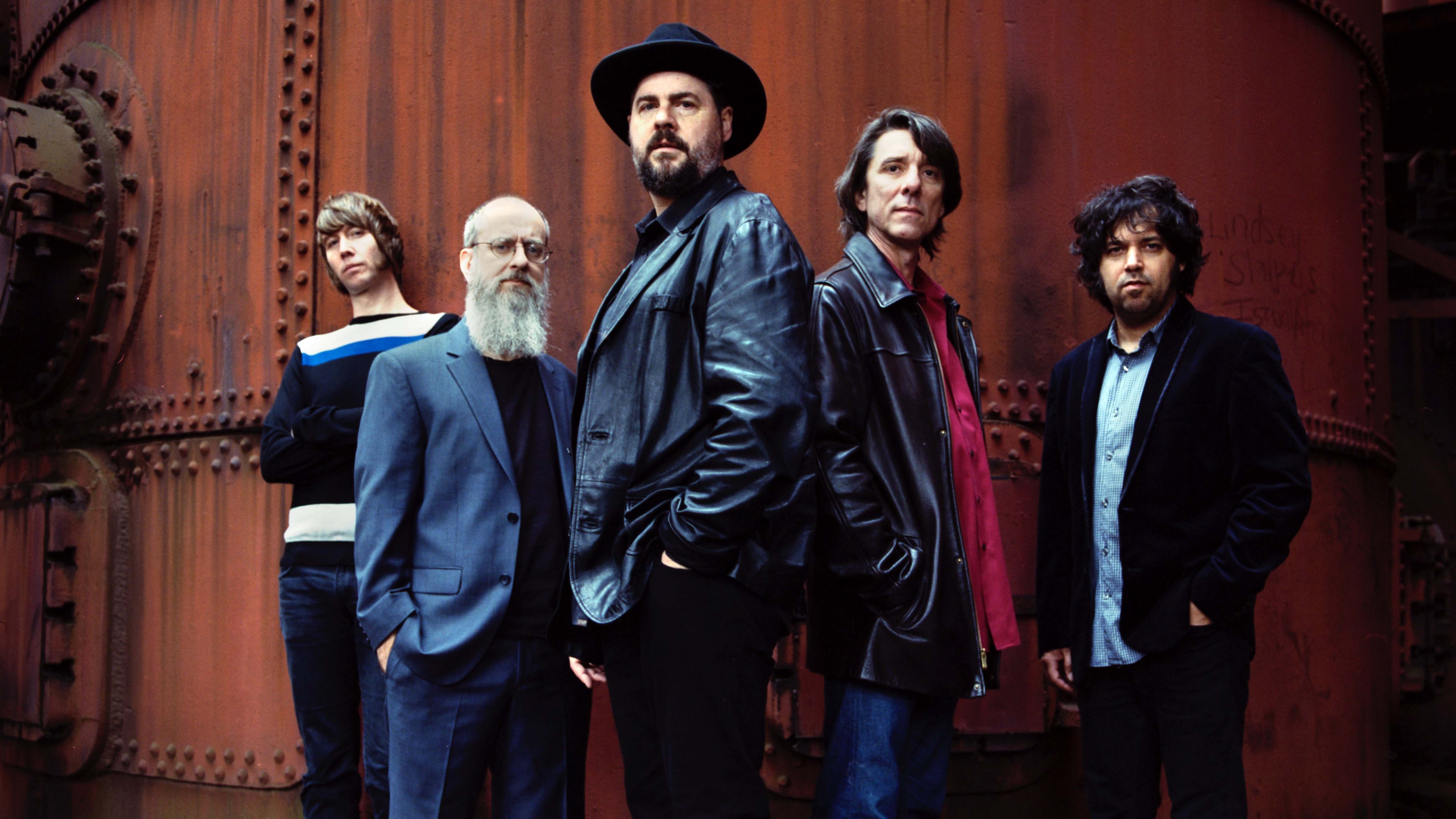For twenty years, Mike Cooley and Patterson Hood of the Drive-By Truckers have sung about the South.
Over the course of their first ten albums, their songs—swampy and sticky, blending country, rock and roll, and R&B—have explored the crimes of the region’s crooks, its stubborn pride, and its deep psychic wounds. Those songs have been mournful, sad, ornery, and hilarious. When the band released its best-of collection in 2011, they named it Ugly Buildings, Whores, and Politicians, indicative of the band’s attraction to the seedy places people go when they think no one’s looking.
But on September’s American Band, their eleventh album, Cooley and Hood step out into the open. It’s still about the South, but like the album title implies, its concerns are nationwide. And immediate. The Truckers usually work fast, and true to form American Band was rush recorded, its songs written in response to changes in the national climate. Hood and Cooley were spurred on by the contentious election and its overtly racist overtones, the death of Trayvon Martin, the white-nationalist attack on the Emanuel African Methodist Episcopal Church in Charleston, South Carolina, the Umpqua Community College shooting in Oregon, the unrest in Ferguson, Missouri, over the shooting of Michael Brown, and a deep questioning of American identity that comes along with all of the above. It feels like a record made for real time.
Cooley and Hood have long written individually, sharing demos via e-mail. Sending material back and forth, they quickly realized they were of one mind regarding this batch of songs.
“We were obviously on the same page,” Cooley says. “It kind of happened gradually. There was a song, and then another one, and then a thing would happen that would lower the flags back to half-mast again. And then there’d be another song. It was really after we started recording that we realized we had a political record. A theme. That’s when we knew it was going to be what it was going to be.”
“Wars are rich men’s wars that poor men fight. It’s irrelevant who stood to lose and who stood to gain; those who stand to lose the most do the fighting, those who stand to gain everything stay home.”
Contrary to the Facebook comments furiously typed in response to one of the band’s live videos that shows a Black Lives Matter banner hanging from an amplifier, the Truckers have always been political. Their attention to dissecting “the duality of the Southern thing” stems from a place of purposeful unraveling, of grappling with one’s heritage, of asking hard questions and being willing to accept hard answers in return. But in recent years, the group’s made its politics explicit and unavoidable. In July of 2015, Hood penned an op-ed for the New York Times Magazine, making his stance clear on the matter of the Confederate flag being displayed: “it’s high time that a symbol so divisive be removed,” he wrote.
Cooley didn’t write an op-ed. Instead, he wrote “Surrender Under Protest,” the third song on American Band.
“We wrote those at the same time, for the same reason,” he says.
Over a heavy Crazy Horse riff, roadhouse piano, and insistent drums, Cooley subverts the titular Confederate slogan with his trademark country sneer. Just under four minutes long, it dismantles the idea of southern nobility.
“That’s one of the things southerners tell themselves,” Cooley says of the enduring justifications that linger in the South regarding the Civil War, such as the common assertion that it was a fight for state’s rights and that slavery wasn’t truly a motivating factor.
“I’ve been guilty over the course of my life, and I’ve struggled with believing some of that stuff myself,” he says.
Growing up, Cooley heard over and over again that most of the men who fought in the Civil War didn’t own slaves—a truth—and for a long time it resonated.
“But so what?” Cooley rebukes. “How many people who have fought in the Middle East are in the oil business? None. Wars are rich men’s wars that poor men fight. It’s irrelevant who stood to lose and who stood to gain; those who stand to lose the most do the fighting, those who stand to gain everything stay home.”
Following the church shooting in Charleston, the Confederate flags outside of federal buildings were finally removed after much protest. Cooley says that the time for familiar conversations about “heritage not hate” has ended.
“I was just so disgusted by that shooting in South Carolina, because that young man was going back to a level of old-school racist terrorism,” he says. “He had to research that. He was able to totally immerse himself and poison himself with hate. And what we learned about the Confederate flag, and how South Carolina begrudgingly moved it off of their capital building…[was that] if this is not enough to take the fucking thing down and shut the fuck up about it, you’re just an asshole. It’s not heritage, you’re just a fuckin’ asshole.”
Such direct, no-flourish language is indicative of American Band’s tone. There are asides, like Cooley’s ribald, righteous skewering in “Kinky Hypocrite” and Hood’s introspective “Don’t Shine,” but for the most part the songs came from a “place of anger and sadness…a little rage,” Cooley says.
“If [the Charleston shooting] is not enough to take the fucking thing down and shut the fuck up about it, you’re just an asshole. It’s not heritage, you’re just a fuckin’ asshole.”
On “What It Means,” Hood brutally evokes the image of Trayvon Martin buried “with a pocket full of Skittles” while his killer is “free to beat up on his girlfriend and wave his brand new gun around.” On “Once They Banned Imagine,” Cooley examines the state of the nation’s civil liberties after 9/11. “From baseless inquiry to no-knocking entry becoming the law of the land / To half-cocked excuses for bullet abuses regarding anything browner than tan,” he sings.
It’s an unflinching record from the get. On opener “Ramon Casiano,” Cooley details the 1931 killing of a fifteen-year-old Mexican boy by the NRA figurehead Harlon B. Carter. Commenting on people who’d “rather fight than win,” Cooley makes it clear: there’s money to be made on the border. All these decades later, Casiano “still ain’t dead enough” to assuage the fears Americans have of Mexico, the kind stoked by Donald Trump each time he brings up his wall.
“We have two borders, but everything everybody’s afraid of is always coming across the one with the brown people on the other side,” Cooley says.
There’s nothing vague about the record, but while it’s plainspoken in the tradition of classic protest music, it’s far from artless. Hood’s “What It Means” ponders why we can’t quite enjoy “an age where limitations are forgotten,” focusing instead on a rotten core, and on “Ever South,” he examines the idea of southern heritage from his vantage point in Portland, where he’s lived since 2015. But it’s obvious what Cooley and Hood are up to here, the line they’ve drawn in the sand. It’s music with intention, and that’s what led to the title. In a year when the definition of a “real” American has been coded with xenophobia and classism, those words take on extra weight.

Drive-By Truckers: Matt Patton, Brad Morgan, Patterson Hood, Mike Cooley, Jay Gonzalez / photo by Danny Clinch
“We kind of struggled coming up with a title all through the process,” Cooley says. “But [American Band] seemed like something really simple and something as direct as everything on the album is… It was [about] reclaiming our American identity for ourselves. Saying to all of these people and ideas we’re challenging, ‘No, you don’t get to decide what is and what is not a real American.’”
Even as Hood sings of being “ever southern in [his] carriage, ever southern in [his] stance,” American Band seeks to examine the country as a whole. The South remains Cooley and Hood’s lens, but what they reflect back is a view of the nation. At the most extreme, the South is a myth northerners and west coasters tell themselves, that that’s where our country’s racist sins took root. But there’s nowhere in America that people haven’t been displaced—often through violence—or systematically disenfranchised. That guilt is secretly written into the history of our country, and shining a light on it is part of the aim of American Band.
“One of the reasons Randy Newman wrote the song ‘Rednecks’ was to point out that in the South, yes, we’re guilty of everything we’re charged with,” Cooley says. “But no one else has any right to moral superiority when it comes to how we treat people of color. Nobody. Then he runs down the list [of places] where people of color are excluded purposefully from opportunity. It’s not just racist rednecks riding through the night wearing bad Halloween costumes. It’s systemic, it’s institutional. It’s written in the law.”
Still, Cooley insists there’s space for optimism.
“Over the same years that all these songs were written, I’ve seen this new generation come of age,” Cooley says. “They’re really rejecting a lot of this strongly. There is this old world and those that thought it belonged to them are losing it. That’s where a lot of this [turmoil is] coming from. If we have to put up with this because it’s a reaction to progress, well, at least there’s progress. It’s never pretty, you know? Change is never easy. People don’t like change—they fear it. But we have changed nonetheless, so there’s a lot to be optimistic about.”
“No one has any right to moral superiority when it comes to how we treat people of color. Nobody.”
Cooley doesn’t know if American Band will change any minds, but it felt important this time to make a statement—one that sounds different coming from “fifty-something white southern guys with working class backgrounds” than “New England intellectuals or Southern California liberals.”
“We’re everything they describe when they describe a Trump supporter,” Cooley says. “It definitely garners some attention to hear someone from this demographic trying to speak this forcefully about these things, making it clear which side we’re on.”
American Band finds the Drive-By Truckers adopting a position, challenging its listeners, and most of all, stating where they stand. It can be a difficult listen. Cooley and Hood sing from a place of defeat, unable to offer any good answers. But there are live shows coming up, where the act of speakers pushing air and rock and roll in sweaty rooms might provide the hope Cooley says the record doesn’t. And even if it doesn’t, the conversations the record’s started have inherent value.
“There are people who believe what they believe and see it the way they see it, and nothing is going to change the way they feel about,” he says. “But if you can just get somebody far enough to go, ‘I’m not quite there yet, but I see your point,’ that’s good enough. I’ll take that.” FL







